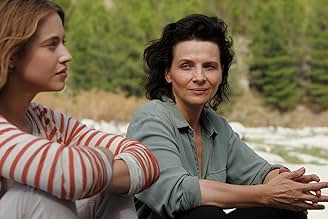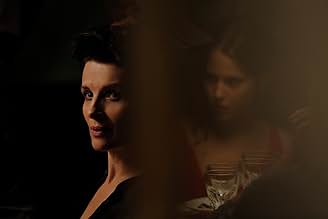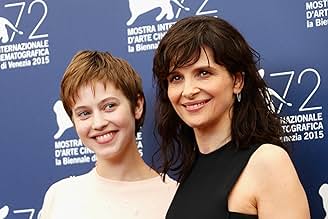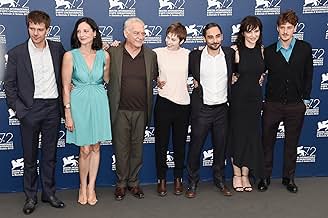IMDb रेटिंग
6.5/10
2.7 हज़ार
आपकी रेटिंग
अपनी भाषा में प्लॉट जोड़ेंA mother unexpectedly meets her son's fiancée at a villa in Sicily and gets to know her as she waits for her son to arrive.A mother unexpectedly meets her son's fiancée at a villa in Sicily and gets to know her as she waits for her son to arrive.A mother unexpectedly meets her son's fiancée at a villa in Sicily and gets to know her as she waits for her son to arrive.
- पुरस्कार
- 7 जीत और कुल 9 नामांकन
फ़ीचर्ड समीक्षाएं
I've seen it as a part of Italian Cinema Festival in Lisbon, the director was there. To the end I wondered how this relatively young man could make it - bring a spectator in the intersection of sorrow, enchantment and tension and keep him there the whole film.
There was a lot of wondering in general - during and after, - a lot of associations and interpretations. The film keeps you very alive in spite of difficult theme, awaken, wanting something from the characters, wanting to be like the characters, asking questions, enjoying slow beautiful shots, colors, landscapes, soundtrack, actresses. Remembering other roles of Juliette Binoche as in "Three colors: Blue" and "Paris, je t'aime", other astonishingly beautiful Italian films like "Stealing beauty". Wishing it to resolute and stop and to continue after titles.
J.S. Foer said "humorous is the only way to tell a sad story". "L 'attesa" with very convincing vitality states that the only way to tell a sad story is beautiful.
There was a lot of wondering in general - during and after, - a lot of associations and interpretations. The film keeps you very alive in spite of difficult theme, awaken, wanting something from the characters, wanting to be like the characters, asking questions, enjoying slow beautiful shots, colors, landscapes, soundtrack, actresses. Remembering other roles of Juliette Binoche as in "Three colors: Blue" and "Paris, je t'aime", other astonishingly beautiful Italian films like "Stealing beauty". Wishing it to resolute and stop and to continue after titles.
J.S. Foer said "humorous is the only way to tell a sad story". "L 'attesa" with very convincing vitality states that the only way to tell a sad story is beautiful.
Plot and character are the classic drivers of cinema but there are other forces of equal impact. Some films are driven more by what does not happen than what does, and photographic technique can transform inaction into deep meaning. This is the case in The Wait (2016), a film title that describes both the story's narrative arc and how it will be experienced by most viewers. Long silent close-ups that record little more than an eyebrow muscle tightening or the strands of hair on a neck are used to convey emotional power of surprising intensity.
Based entirely on the interaction between two women and the inability of one to reveal a painful truth to the other, the plot and character range is unusually sparse. The story opens with a funeral and the palpable raw grief on the face of a mother who has lost a son. Anna (Juliette Binoche) is in a deep dark place when she takes a call from beautiful young Jeanne (Lou de Laage) who asks why her son Giuseppe did not meet her at the airport. Anna invites Jeanne to wait for him at the Sicilian family villa, knowing he will never come. The pair move from a strained and awkward start to a warm friendship, all the while with Jeanne confused and Anna struggling with suppressed emotional turmoil. Anna has Giuseppe's cell phone and listens to Jeanne's desperate calls to her son, but withholding the truth gives him a tangible presence that keeps him alive and eases Anna's pain. For as long as she can gaze upon Jeanne, she can see through her dead son's eyes and share his delight in her innocence and charm.
This story rests entirely on the extraordinary ability of its two stars to convey the full gamut of emotion with total authenticity. The face of Binoche in particular is like a canvas onto which she paints every colour of the rainbow, with subtle shifts of expression that span joyful laughter to the very edge of sanity. Many viewers will find this a difficult film to watch because of the gradually escalating tension created by Anna holding back the truth from Jeanne, and this transforms the drama into a psychological thriller. It is impossible not to judge Anna or not to consider how we would handle such a situation, and this self-reflective process only heightens tensions both inside the film and within ourselves. The performances could easily have slipped into a melodrama, but instead, the minimalist dialogue and slow pace creates an open space into which is hung a finely wrought portrait of parental grief.
Based entirely on the interaction between two women and the inability of one to reveal a painful truth to the other, the plot and character range is unusually sparse. The story opens with a funeral and the palpable raw grief on the face of a mother who has lost a son. Anna (Juliette Binoche) is in a deep dark place when she takes a call from beautiful young Jeanne (Lou de Laage) who asks why her son Giuseppe did not meet her at the airport. Anna invites Jeanne to wait for him at the Sicilian family villa, knowing he will never come. The pair move from a strained and awkward start to a warm friendship, all the while with Jeanne confused and Anna struggling with suppressed emotional turmoil. Anna has Giuseppe's cell phone and listens to Jeanne's desperate calls to her son, but withholding the truth gives him a tangible presence that keeps him alive and eases Anna's pain. For as long as she can gaze upon Jeanne, she can see through her dead son's eyes and share his delight in her innocence and charm.
This story rests entirely on the extraordinary ability of its two stars to convey the full gamut of emotion with total authenticity. The face of Binoche in particular is like a canvas onto which she paints every colour of the rainbow, with subtle shifts of expression that span joyful laughter to the very edge of sanity. Many viewers will find this a difficult film to watch because of the gradually escalating tension created by Anna holding back the truth from Jeanne, and this transforms the drama into a psychological thriller. It is impossible not to judge Anna or not to consider how we would handle such a situation, and this self-reflective process only heightens tensions both inside the film and within ourselves. The performances could easily have slipped into a melodrama, but instead, the minimalist dialogue and slow pace creates an open space into which is hung a finely wrought portrait of parental grief.
Anna's house is in mourning. As the mirrors are covered and the doors a locked, an unexpected guest walks through the front door. It's Jeanne, the girlfriend of her son, who had arrived to spend the Easter with him and his family. Seeing the opportunity to take her mind of her sadness Anna embraces Jeanne with all hear heart. But as the days go by, and her son does not appear, will she be able to tell Jeanne the terrible truth?
Piero Messina – assistant director of the Italian Oscar winner Great Beauty, creates a movie full of symbolism. With every frame holding some sort of meaning, the film is beautiful and deep, like the Sicilian lake on the border of which the story takes place.
THE WAIT is quite a cinematic journey for a small film, which is basically focused on two performances. Playing with themes of resurrection, the movie unravels to us the picture of grief, and by the end it will stand before us, truly exposed, just like unveiled statue of Virgin Mary in the final scenes.
Juliette Binoche is a great performer and she has an interesting role here. Her Anna is deeply damaged but climbing to life, finding a relief in her son's girlfriend's visit. For young and charismatic Lou de Laage in the role of Jeanne this is a big step up from her previous roles of troubled teenagers and shows just how much she grew up as an actor.
Focusing on the developing friendship between the two very different women, the movie always balances on the edge, where a few words can end everything.
With its beautiful imaginary and haunting score, THE WAIT is still not an easy experience, but it has the charm of a dark fairy tale and quickly draws you in. This is an intelligent piece of cinema that will benefit from multiple viewing.
Piero Messina – assistant director of the Italian Oscar winner Great Beauty, creates a movie full of symbolism. With every frame holding some sort of meaning, the film is beautiful and deep, like the Sicilian lake on the border of which the story takes place.
THE WAIT is quite a cinematic journey for a small film, which is basically focused on two performances. Playing with themes of resurrection, the movie unravels to us the picture of grief, and by the end it will stand before us, truly exposed, just like unveiled statue of Virgin Mary in the final scenes.
Juliette Binoche is a great performer and she has an interesting role here. Her Anna is deeply damaged but climbing to life, finding a relief in her son's girlfriend's visit. For young and charismatic Lou de Laage in the role of Jeanne this is a big step up from her previous roles of troubled teenagers and shows just how much she grew up as an actor.
Focusing on the developing friendship between the two very different women, the movie always balances on the edge, where a few words can end everything.
With its beautiful imaginary and haunting score, THE WAIT is still not an easy experience, but it has the charm of a dark fairy tale and quickly draws you in. This is an intelligent piece of cinema that will benefit from multiple viewing.
"The Wait" ("L'Attesa") is a film that has really nice acting but the story itself didn't do much for me. Its vague ending left me cold and the behaviors of the leading lady, Anna (Juliet Binoche) just didn't make a lot of sense--regardless of what REALLY happened at the end.
When the film begins, Jeanne (Lou de Laâge) arrives at a Sicilian villa and instead of being greeted, she's given a meal by a servant and then retires to bed without seeing the woman of the house, Anna. The next day, Jeanne comes downstairs and finds that there's been some sort of funeral...and Jeanne tells her it's because her brother died...though it's pretty obvious that this might NOT be the truth. Jeanne has come to see Anna's son and spend her vacation with him....but through the course of the film, the son never arrives and Jeanne is feeling abandoned...though Anna and her seem to have a few moments together bonding.
Where does all this go? Well, as I mentioned above, the ending is a bit vague and it's easy to see two very different interpretations. I didn't really care about either one because Anna's actions simply didn't make much sense....and because of that the film lost me. Well acted, this film needed some better writing as the characters didn't always seem realistic or believable.
When the film begins, Jeanne (Lou de Laâge) arrives at a Sicilian villa and instead of being greeted, she's given a meal by a servant and then retires to bed without seeing the woman of the house, Anna. The next day, Jeanne comes downstairs and finds that there's been some sort of funeral...and Jeanne tells her it's because her brother died...though it's pretty obvious that this might NOT be the truth. Jeanne has come to see Anna's son and spend her vacation with him....but through the course of the film, the son never arrives and Jeanne is feeling abandoned...though Anna and her seem to have a few moments together bonding.
Where does all this go? Well, as I mentioned above, the ending is a bit vague and it's easy to see two very different interpretations. I didn't really care about either one because Anna's actions simply didn't make much sense....and because of that the film lost me. Well acted, this film needed some better writing as the characters didn't always seem realistic or believable.
This is a haunting movie, but I think it could have used a tad more plot. Even Binoche's genius for ambiguous facial expressions strains to paper over deficiencies in the story.
I was intrigued to see that it was based on a Pirandello play, but "based" is too strong - it's at best inspired by "La vita che ti diedi", and from what I can tell (I'm not fluent in Italian) the movie omits most of the play's boldest psychological points.
I was intrigued to see that it was based on a Pirandello play, but "based" is too strong - it's at best inspired by "La vita che ti diedi", and from what I can tell (I'm not fluent in Italian) the movie omits most of the play's boldest psychological points.
क्या आपको पता है
- ट्रिविया"L'attesa" is a period of time whose duration is unknown and therefore it symbolizes a real act of faith. In this case, this act for Anna and Jeanne consists in waiting for the return of Giuseppe, the son of Anna and Jeanne's boyfriend, with the difference that the first knows the truth, while the second lives in the mystery. The return of Giuseppe takes on the meaning of a miracle. The song "Waiting for the miracle" emphasizes this detail.
- गूफ़About one half hour into the movie Binoche cracks an egg into a frying pan, thereby breaking the yolk. However, when she serves it to her son's girlfriend the yolk is whole.
- भाव
Anna Remigi: Jealousy means that there is still desire.
- कनेक्शनFeatures Arrangiatevi (1959)
- साउंडट्रैकOrchestral Loop
Music by Ben Lukas Boysen
Published by Erased Tapes Music
टॉप पसंद
रेटिंग देने के लिए साइन-इन करें और वैयक्तिकृत सुझावों के लिए वॉचलिस्ट करें
- How long is L'attesa?Alexa द्वारा संचालित
विवरण
- रिलीज़ की तारीख़
- कंट्री ऑफ़ ओरिजिन
- आधिकारिक साइटें
- भाषाएं
- इस रूप में भी जाना जाता है
- The Wait
- फ़िल्माने की जगहें
- उत्पादन कंपनियां
- IMDbPro पर और कंपनी क्रेडिट देखें
बॉक्स ऑफ़िस
- बजट
- €32,00,850(अनुमानित)
- US और कनाडा में सकल
- $55,804
- US और कनाडा में पहले सप्ताह में कुल कमाई
- $5,686
- 1 मई 2016
- दुनिया भर में सकल
- $10,10,766
- चलने की अवधि
- 1 घं 40 मि(100 min)
- रंग
- पक्ष अनुपात
- 2.35 : 1
इस पेज में योगदान दें
किसी बदलाव का सुझाव दें या अनुपलब्ध कॉन्टेंट जोड़ें





























